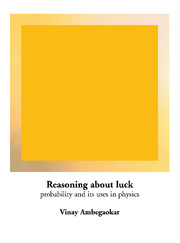Book contents
- Frontmatter
- Contents
- Preface
- 1 Introduction
- 2 The likely, the unlikely, and the incomprehensible
- 3 Normality and large numbers
- 4 Examples
- 5 A little mathematics
- 6 Forces, motion, and energy
- 7 Atoms, molecules, and molecular motion
- 8 Disorder, entropy, energy, and temperature
- 9 Heat, work, and putting heat to work
- 10 Fluctuations and the arrow of time
- 11 Chaos
- 12 Quantum jumps: the ultimate gamble
- Index
7 - Atoms, molecules, and molecular motion
- Frontmatter
- Contents
- Preface
- 1 Introduction
- 2 The likely, the unlikely, and the incomprehensible
- 3 Normality and large numbers
- 4 Examples
- 5 A little mathematics
- 6 Forces, motion, and energy
- 7 Atoms, molecules, and molecular motion
- 8 Disorder, entropy, energy, and temperature
- 9 Heat, work, and putting heat to work
- 10 Fluctuations and the arrow of time
- 11 Chaos
- 12 Quantum jumps: the ultimate gamble
- Index
Summary
If, in some cataclysm, all of scientific knowledge were to be destroyed, and only one sentence passed on to the next generation of creatures, what statement would contain the most information in the fewest words? I believe it is the atomic hypothesis (or the atomic fact, or whatever you wish to call it)…
Richard P. FeynmanThat a gas, air for example, is made up of a myriad tiny bodies, now called molecules, moving about randomly and occasionally colliding with each other and with the walls of a containing vessel, is today a commonplace fact that can be verified in many ways. Interestingly, this molecular view was widely though not universally accepted long before there were experimental methods for directly confirming it. The credit for the insight has to go to Chemistry, because a careful study of chemical reactions revealed regularities that could most easily be understood on the basis of the molecular hypothesis. These regularities were known to chemists by the end of the eighteenth century. By this time, the notion of distinct chemical species, or ‘elements,’ was well established, these being substances, like oxygen and sulfur, that resisted further chemical breakdown. It was discovered that when elements combine to make chemical compounds they do so in definite weight ratios. It was also found that when two elements combine to make more than one compound the weights of one of the elements, when referred to a definite weight of the second, stand one to another in the ratio of small integers – which sentence is perhaps too Byzantine to be made sense of without a definite example.
- Type
- Chapter
- Information
- Reasoning about LuckProbability and its Uses in Physics, pp. 102 - 119Publisher: Cambridge University PressPrint publication year: 1996

